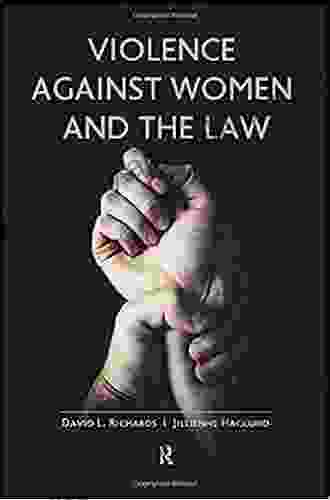Violence against women is a pervasive and devastating issue that affects countless lives across the globe. From domestic abuse to rape and sexual harassment, women face a range of threats that can have profound consequences for their physical, emotional, and mental well-being. Addressing this critical problem requires a multifaceted approach that involves legal, social, and cultural interventions.
The book "Violence Against Women and the Law: International Studies Intensives" offers a comprehensive examination of this complex issue. Through in-depth research and insightful analysis, the authors explore the legal frameworks, cultural dynamics, and societal responses to violence against women in various countries worldwide.
4.1 out of 5
| Language | : | English |
| File size | : | 1521 KB |
| Text-to-Speech | : | Enabled |
| Screen Reader | : | Supported |
| Enhanced typesetting | : | Enabled |
| Word Wise | : | Enabled |
| Print length | : | 180 pages |
Legal Frameworks and Protection
The book delves into the legal systems of different nations to analyze how they address and protect women from violence. It examines the strengths and weaknesses of existing laws, the role of law enforcement agencies, and the challenges in ensuring effective implementation.
By examining case studies and best practices, the book highlights successful strategies for creating a legal framework that safeguards women's rights and provides access to justice. It discusses the importance of victim support systems, specialized courts, and the need for gender-sensitive training for legal professionals.
Cultural Context and Social Norms
Violence against women is often rooted in deep-seated cultural beliefs and social norms. The book explores how cultural factors, such as gender roles, power dynamics, and societal attitudes, shape the incidence and severity of violence against women.
Through anthropological and sociological research, the authors analyze the ways in which cultural norms can perpetuate violence and hinder the reporting and prosecution of such crimes. They also examine the role of education, media, and community outreach in challenging harmful beliefs and promoting gender equality.
International Collaboration and Cooperation
Addressing violence against women effectively requires international cooperation and collaboration. The book highlights the importance of international treaties, conventions, and declarations that set standards for protecting women from violence.
It discusses the role of international organizations in monitoring compliance with these agreements and provides examples of successful collaborations between governments, non-governmental organizations, and civil society groups. The book also explores emerging best practices for data collection, victim support, and perpetrator accountability at the international level.
Case Studies and Lessons Learned
"Violence Against Women and the Law: International Studies Intensives" includes in-depth case studies from various countries around the world. These case studies provide real-world examples of how different societies have approached the issue of violence against women and the lessons that can be learned from their experiences.
Through comparative analysis, the authors identify effective interventions, best practices, and areas for improvement. The case studies highlight the importance of tailoring solutions to the specific cultural and socio-economic contexts of each country.
Empowering Global Understanding
The book's primary aim is to empower global understanding of violence against women and provide a valuable resource for researchers, policymakers, activists, and anyone dedicated to eliminating this scourge from society.
By offering a comprehensive overview of legal frameworks, cultural factors, and international collaboration, the book equips readers with the knowledge and tools they need to advocate for change and create a world where women are free from violence and live in safety and dignity.
Violence against women is a pressing global issue that demands our attention and action. "Violence Against Women and the Law: International Studies Intensives" provides an invaluable contribution to the field by offering a comprehensive analysis of this complex problem.
Through its in-depth research, insightful analysis, and practical case studies, the book empowers readers to understand the legal, cultural, and social dimensions of violence against women. It offers a path forward for creating a more just and equitable society where women's rights are respected and their safety is guaranteed.

























































































